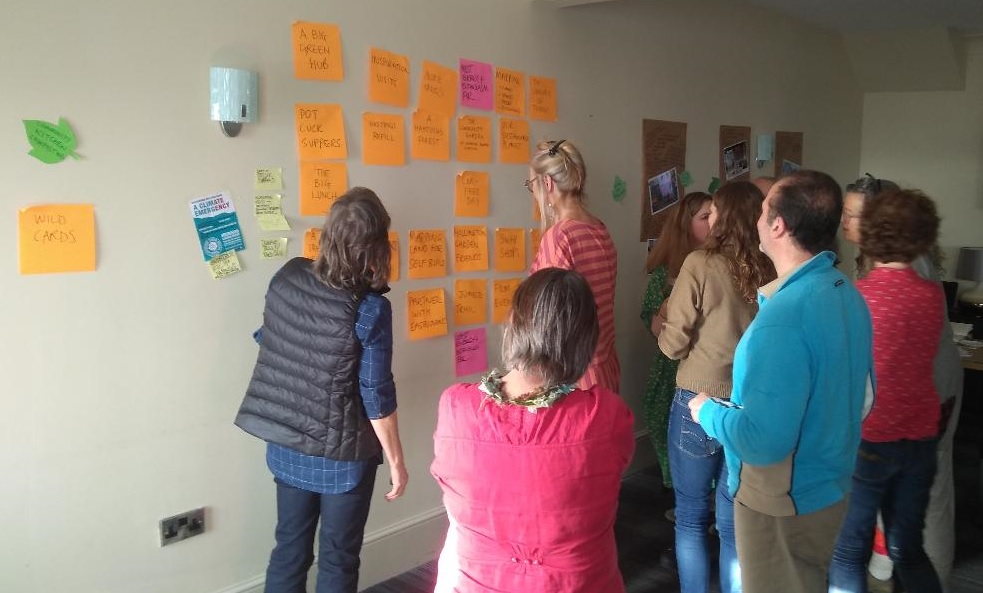Blog
-

The Common Treasury talks lockdown on Hastings Isolation Station.

Claire Doran talks to Rob Hopkins and Maff Potts The Common Treasury of Adaptable Ideas is running weekly community conversations on Isolation Station Hastings.
Imagining Life Beyond Lockdown are online conversations that include people from many of the projects featured at Common Treasury past events such as Rob Hopkins from the Transition Town Network.
Catch up on the previous conversations on Hastings Isolation Station.
-

Earth Challenge 2020
Support science today: Join Earth Challenge 2020 and be part of the world’s largest ever coordinated citizen science campaign.
The initiative will combine data from existing citizen science projects with information from a new mobile app to shed light on key environmental issues and grow citizen science worldwide.
https://earthchallenge2020.earthday.org/
By downloading the Earth Challenge 2020 app, you’re joining a community of activists answering critical questions:
What’s in the air where I live and breathe?
What kinds of litter and trash are polluting my environment?
How can I take action as a citizen scientist while homebound during the COVID-19 pandemic?
The app is easy: Just take pictures of the air or litter on the ground and submit the photo through your phone or tablet. Your data will be added to the global citizen science database mapping the health and safety of citizens across the world. And you can do this from the safety of your own home.
-

Hastings Launches Live-Streaming Channel to Keep Spirits High
On Wednesday 25th March, The Observer Building (Hastings), launched a Facebook channel to offer a platform to the local community during the nationwide lockdown. The channel, Isolation Station Hastings, is working with a range of local people and organisations to live-stream daily content from people’s homes and is calling out to the local community to contribute live-streamed content.
In its first three days, the channel has gained almost 2,000 followers and 50,000 minutes viewed with a daily chat show, and music performances from renowned jazz singer Liane Carroll, BRIT Award winning song-writer Blair Mackichan, Wildflowers singer Siddy Bennett, Doc Savage and Buddha Triangle. This week’s schedule includes a life-drawing class with Sue Tilley,who posed for Lucian Freud’s £17m painting ‘Benefits Supervisor Sleeping’, a film show interviewing local film-makers, Coastal Currents Arts Hour, a pottery class, yoga and a Saturday-night zoom party for up to 500 participants.
The channel has been prompting viewers to raise money to support local NHS workers with Liane Carroll’s performance, raising over £1600 alone. They also have a daily community news show led by Hastings’ local emergency volunteers who are part of the Hastings Emergency Action Response Team (HEART).
Jess Steele OBE, who oversees The Observer Building project, said: “Our town is renowned for its creativity, culture and community and we want to do our very best to keep that alive during these unprecedentedly challenging times. Staying at home doesn’t mean we can’t stay connected and keep our spirits high, as well as offer our services to those most in need.”
The platform offers live-streamed Facebook slots to artists, performers, creators, pubs, local businesses, organisations, teachers and anyone who has an idea for content that could be entertaining, informative or offer learning. Some slots are paid, some offer funding opportunities through viewer donations, and some will raise money for a charity of the content-provider’s choice.
The channel is being run by The Observer Building, which was due to launch this spring with a season of events, workshops and other projects, which have been cancelled due to COVID-19. The channel is funded by Leisure & Learning (Hastings), the Common Treasury of Adaptable Ideas and Hastings Voluntary Action.
The channel is live with an ever-evolving schedule on:
Hastings and St Leonards locals who would like to contribute content can do so through filling out a google form which contains full details.
If you’d like to contribute a show, please fill out our google form here: https://forms.gle/5hZpqP4tALEcQaMh6
PRESS
For interviews please contact:
isolationstationhastings@gmail.com
About Leisure & Learning (Hastings) Ltd
The Hastings Commons is a collection of interconnected buildings and spaces in the town centre that have been brought into community ownership since 2014. In February 2019, the Commons was expanded significantly with the purchase of The Observer Building, a 7-storey, print factory, derelict since 1985.
Leisure & Learning is a charity set up to ‘activate and animate the spaces of the Hastings Commons’. Our programming offers a broad mix of lifestyle and life-long learning, vocational training and community education intermixed with cultural and popular entertainment events.
Underlining all our activities is a desire to create positive social impact by providing life-changing and place-shaping opportunities for local people, especially those who usually miss out. Our programming is designed to be diverse, inclusive, affordable and multi-faceted.
For more visit: www.theobserverbuilding.org.uk/leisureandlearning
About The Common Treasury of Adaptable Ideas
The Common Treasury of Adaptable Ideas creates spaces for people who want to make a real difference to the local community-enterprise sector. By showcasing change-makers and great ideas from elsewhere, our events act as a springboard for inspiring and energising positive change in Hastings.
With the generous support of the Big Lottery’s Power-to-Change programme, the programme launched in March 2019 and has been extended for a further year, to February 2021. The programme includes knowledge-sharing, idea-development, seed-funding and peer-mentoring, helping participants to transition great ideas into actionable enterprises in the community.
The Common Treasury aims to help shift mind-sets – moving thinking from beyond existing ‘damage-limitation’ approaches – to thinking about what community-led enterprises look like when based on a sustainable local economy that makes links between people, place and planet.
For more visit: www.commontreasury.org.uk
About Hastings Voluntary Action
Hastings Voluntary Action supports charities, communities and social enterprises in the Hastings area, promotes volunteering, and runs community projects to support people in the Borough.
For more visit: www.hastingsvoluntaryaction.org.uk
-

COVID-19 EMERGENCY COMMUNITY HUB
COVID-19 EMERGENCY COMMUNITY HUB
Led by Hastings Voluntary Action, co-ordinating all local VCSE (Voluntary, Community and Social Enterprise) sector activities in partnership with Hastings Borough Council, the CCGs (Clinical Commissioning Groups), ESCC (East Sussex County Council) and the NHS
CV-19 EMERGENCY HELPLINE FOR HASTINGS
01424-451019
hosted by Hastings Borough Council, open Mon-Thurs 9-5pm; Friday 9-4.30pm
VOLUNTEERING
Hastings Emergency Action Response Team (HEART)
Contacts: Alastair Fairley or Kim Batty
Hastings Voluntary Action Telephone Befriending Service
Contacts: Debby Anderson or Laura Jeffcote, Age-Friendly Volunteer Project, HVA
T: 01424 444010
E: Laura@hastingsvoluntaryaction.org.uk
E: Debby@hastingsvoluntaryaction.org.uk
GIVING MONEY TO LOCAL RELIEF EFFORTS
Hastings Relief Fund
(HVA is managing this fund)
Donate through www.Crowdfunder.co.uk (they’ve waived all their fees)
A number of organisations including ESCC, Aviva, Nationwide, etc match-fund donations to the tune of 50% of the money raised – to a total of $2,500
So the £5k on the donations page only needs to reach £2500, then match-funding kicks in
People can also donate directly through HVA’s own bank account
Sort code: 30-97-66
Acct number: 39261160
Friends of Conquest Hospital staff well-being fund
Donations online at www.conquestlof.org.uk
MENTAL HEALTH & WELLBEING
See Hastings Voluntary Action Mental Health & Wellbeing Support page for a comprehensive list
-

Just Transition 20/30: Our Action Plan for 2020
On Saturday, 1 February, 30 Transition Town members came together at the White Rock Hotel to explore, debate and agreed on some exciting new priorities for 2020. We agreed to focus on some exciting new projects – details below.
If you’re interested in knowing more or want to get involved, please do get in touch at info@transitiontownhastings.org.uk and feel free to spread the word !!!
A Green Hub for Hastings and St Leonards
A real or virtual hub that provides space to connect – bringing together individuals and groups keen on creating a more sustainable and integrated community. Similar conversations are taking place within The Common Treasury, in XR and at Energise Sussex Coast (ESC) so this is a great opportunity for collective action! Talk to Kate Meakin or Julia Hilton for info.
A Library of Things:
Initially introduced at The Common Treasury in October, it’s a great idea that has members keen to get one happening in Hastings. Why buy, if you can borrow? If you want to know more, check out
https://www.libraryofthings.co.uk/ or talk to Ursula McLaughlin or Sherry Clark.
A Hastings Woodland/ Planting Trees
Planting trees was a popular priority – in town and country! Kate Meakin, Mary Dawson and Ken Davis are our champions.
Field Trips and Feasts
A series of learning journeys to places that inspire (Great Dixter and The Bevy got special mentions) and our always-popular potluck dinners. More events that bring us together for food and fun. Talk to Sherry Clark if you have any suggestions!
Map the Territory
From Living Streets to empty buildings, members are keen to contribute to creating an inventory of what’s there, what can be done and who is doing what – to help bring like-minded people and groups together. Sarah Macbeth and Julia Hilton are the go-to-gals for this one.
Hollington Gardens Friends:
A new initiative that matches keen volunteers with neglected family gardens. Lynn Savage or Maya Evans can tell you more.
We also agreed to continue to invest in existing projects & partnerships:
- The Community Garden at Warrior Square Station (talk to Chris Petts, Alan Jeffries, Mick Studd or Michelle White)
- The Big Lunch – this year on Sunday, 7 June in Warrior Square Gardens (Talk to Sherry Clark)
- Refill points around town, where you can fill up your reusable water bottle (Talk to Hannah Robbins at Wonderfill)
- The Common Treasury of Adaptable Ideas(on Climate Action) (Talk to Sherry or Julia Hilton)
- Activities related to Sustainability on Sea (Talk to Kate Meakin or Sarah Macbeth)
- Sustainable transport, architecture and urban-planning (Contact Ken Davis or Julia Hilton)
A few projects have been put on hold – for now. We just can’t do everything!
- Sustainability on Sea will happen next in Spring 2021, following on from a hopefully successful and inspiring COP26 in Glasgow in December
- Car Free Day: after a great turnout in 2019, despite adverse weather, we are still looking for volunteers keen to take this forward in 2020 or 2021. The newly-formed Living Streets group is also keen to get involved in street
- Swap shops, a local currency scheme, a network of initiatives around Sussex and beyond.

